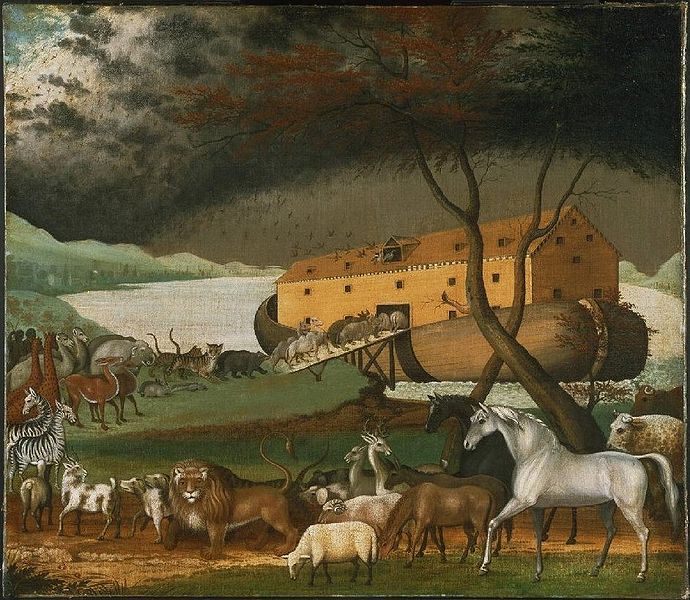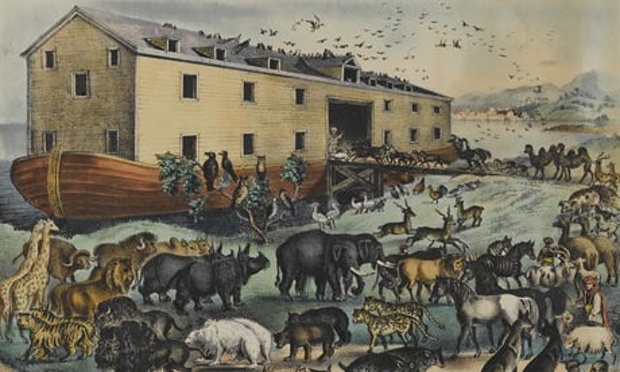.........Animal-Human Equality - Noah and the Flood........
Job 12:7-10 New International Version (NIV)
7 "But ask the animals, and they will teach you,
or the birds in the sky, and they will tell you;
8 or speak to the earth, and it will teach you,
or let the fish in the sea inform you.
9 Which of all these does not know
that the hand of the Lord has done this?
10 In his hand is the life of every creature
and the breath of all mankind.
Animal-Human Equality - Noah and the Flood
The equality of animals and humans is immortalized in the biblical story of Noah and the Flood. Noah was
commanded to save every species of animal on Earth; in contrast only a relatively few human beings were saved from the flood.
This story is presented here not as a historical fact or religious believe, but as an ancient myth
showing the animal/human bond and the indispensable relationship of animals and humans.
From the CompuWorks Desktop Bible, King James Version, the Book of Genesis, beginning chapter 6, verse 13. (Note, the story of Noah is found in many faiths)
"And God said unto Noah…make thee an ark of gopher wood…the length of the ark shall be three hundred cubits, the breadth of it fifty cubits, and the height of it thirty cubits…And, behold, I, even I, do bring a flood of waters upon the earth, to destroy all flesh, wherein is the breath of life, from under heaven; and every thing that is in the earth shall die. But with thee will I establish my covenant; and thou shalt come into the ark, thou, and thy sons, and thy wife, and thy sons' wives with thee. And of every living thing of all flesh, two of every sort shalt thou bring into the ark, to keep them alive with thee; they shall be male and female. Of fowls after their kind, and of cattle after their kind, of every creeping thing of the earth after his kind, two of every sort shall come unto thee, to keep them alive."
Noah's Ark: the scientific version
With the weather worsening, it may be time to build a second ark to preserve the ecosystem. But can it be done using science, instead of divine
intervention?
Dean Burnett
Tuesday 29 October 2013 08.49 EDT
The UK experienced a major storm this week. Cardiff, where I live, had the highest rainfall in the country. This is nothing unusual in Wales. They say there's an obesity epidemic in Wales, but we're probably just evolving layers of blubber to keep warm/buoyant, like walruses.
Still, the storm was severe. This, coupled with the recent IPCC report into climate change, leads to only one logical conclusion; the apocalypse has begun, and it's a wet one. A combination of rain and sea-level rises is going to mean all dry land will soon be submerged.
As most people know, this has happened before (sort of). And if it ain't broke, don't fix it. So the most logical course of action in response to the watery threat would be to build an ark and put two of every animal in it, to survive the flood and repopulate the Earth once it recedes.
The issue with this plan is that the original Noah's Ark was the result of divine will and stuff like that. I don't have the backing and resources of an all powerful God, so any attempt to build a similar ark would have to rely solely on good-old science. Of course, if you use science to build Noah's Ark then you have to obey the laws of nature, and this leads to a number of issues.
Construction
The original Noah's Ark was supposedly 300 cubits long, 50 wide and 30 high (139m x 23m x 13m in the metric system). That's big, especially for a boat made of wood. So big in fact that it would be impossible. To clarify; it would be possible to build, it just wouldn't function as a boat, due to being incredibly fragile thanks to the Euler-Bernoulli beam theory and other physics. Basically, the bigger something is, the more fragile it is. This is why, sadly for fans of Pacific Rim, you can't use a tanker as a cudgel even if you're a gargantuan robot.
But if we assume that the original ark was wooden due to the limitations of the construction industry in Old Testament days, there's no reason why this has to apply in our modern scientific age. Metals like steel and modern understanding of shipbuilding mean we can construct bigger, hardier vessels, even without divine intervention.
Exactly how one person is meant to build a full-sized working metal ship is another matter, when you consider the scale of modern shipyards. It would be easier to just "acquire" a ready-made one. Maybe the biggest one?
Getting the animals
The next job is to round up two of every species. This, if anything, is even more daunting. The original ark had apparently 16,000 animals, many of which were small versions sent directly by God. Modern science isn't so helpful. Current estimates put the number of species on Earth at 8.7 million, most of which are animals. But even if only half were animals (a conservative estimate), that still means 8.7 million individual creatures needed for mating and breeding (assuming they can't do it asexually). That's a lot of organisms.
Most of the work will require discovering the 90% of undiscovered species still out there. I'd die of old age before I'd even finished doing the calculations for working out how long that would take (maths isn't a strong point of mine). But even if we use the criteria of the original ark and only take macroscopic vertebrates (it's inevitable that bacteria and insects will get in regardless), it's still logistically tricky.
Say I collect two mice. Then I go and get some elephants (requiring long-distance travel, shipping and paperwork), then a couple of zebras, and so on. Mice live for about two years, so I'll have barely made any progress in animal gathering before the first collected have died of old age. Species lifespans will have to be worked out in advance and a complicated gathering schedule calculated. I'd be cutting corners after the first week. For example I probably won't bother with pandas; it'll be a bureaucratic nightmare, and they've had their chance.
Some might say this wouldn't do much for species diversity in a complex ecosystem, but given that we may have gotten the concept of species from the Noah's Ark story originally, it seems apt.
The voyage
If I somehow do get "all" necessary species into the ship and we set off as the waters rise, that's when the real issues begin. The original flood supposedly lasted for a year and 10 days. Given the complexity of climate science there's no way to be so precise this time, so we may well be in it for the long haul.
This bodes ill because, regardless of the space available, some animals don't function well in captivity at all. Some would need exercise and walking, others would need more regular cleaning. Even the most common domestic beats require different environmental conditions to ensure survival. Granted, modern ships have sophisticated ventilation and the like, but it would take some significant engineering to accommodate passengers from climates spread across the globe.
Then there's the biosphere. A lot of cargo space will have to be used for food, but what food? Lions and other big predators require a lot of raw meat; how to keep that fresh during a long voyage? I guess if other animals do keel over despite our efforts there's always the option of using them, but this isn't sustainable. The sea itself could provide a lot of food, but the ecosystem there will be in chaos due to things like saltwater and freshwater mixing, inevitable during a global flood.
Then there are also the small things like motion sickness, which animals can suffer from. So even if conditions were perfect, they'd still be miserable and ill.
Resignation
There are undoubtedly countless other scientific limitations on building a Noah's Ark in modern times that make the whole thing an exercise in futility. Just reading this back makes me want to get unspeakably inebriated and just wait for the waters to overwhelm us. Perhaps it would be better if something like the cuttlefish take over. Good luck to them.
Also, it's now quite sunny here at present, so perhaps this whole piece was slightly premature.
Dean Burnett is happy to hear suggestions for surviving unlikely Armageddons on Twitter, @garwboy






































































































































